China’s waste sorting achievements showcased for foreign media

BEIJING- A number of foreign journalists from different countries around the world got familiar with some achievements of China in waste soring and recycling in an event held at Qijiayuan Diplomatic Residence Compound (DRC) in Beijing on Sunday (April 28).
A waste-sorting machine working by artificial intelligence (AI) techniques was showcased at that place, and journalists saw how it works.
Also, an exhibition of products produced from recycled materials was held at the same place.
Entertainment programs were also held for the children to encourage them to waste sorting and recycling activities.
And at the end of that visit, a ceremony was held for the participants in which Chinese opera and some other entertainment programs were performed.
Beijing Municipal Center for Foreign-related Environment Sanitation Services contributed to holding the mentioned programs.
The waste management processes typically involve numerous technical, climatic, environmental, demographic, socio-economic, and legislative parameters. Such complex nonlinear processes are challenging to model, predict and optimize using conventional methods.
Recently, artificial intelligence (AI) techniques have gained momentum in offering alternative computational approaches to solve solid waste management (SWM) problems.
AI has been efficient at tackling ill-defined problems, learning from experience, and handling uncertainty and incomplete data. Although significant research was carried out in this domain, very few review studies have assessed the potential of AI in solving the diverse SWM problems.
To prevent the rapid increase in global e-waste generation from causing serious environmental pollution and adverse effects on human health, proper e-waste management is critical. In recent years, China has begun to pay more attention to e-waste management because the informal recycling and disposal by unauthorized collectors have brought serious environmental problems in some areas.
The application of intellectual technologies has given new opportunities for more effective e-waste management. Many companies in China are developing smart e-waste collection and recycling systems by applying the Internet of Things (IoT), big data, cloud computing, and artificial intelligence (AI).
It should be mentioned that China International Press Communication Center (CIPCC) arranged the visit to the waste sorting and recycling exhibition for the foreign journalists.
CIPCC, under the China Public Diplomacy Association (CPDA), has initiated a program to build a platform for the media from countries around the world, especially developing countries, to observe China and study development in this country.
The program aimed at media exchange was halted in 2020 and 2021 due to the Covid-19 epidemic.
In each edition of the program, journalists from all around the world gather together to get familiar with the modern China and exchange their experiences in the field of journalism.
In 2024 edition of the program, scheduled to be held from late February until late June, over 100 journalists from more than 90 countries are participating.
Photo: Some products produced from recycled wastes showcased in an exhibition held at Qijiayuan DRC in Beijing (By Mahnaz Abdi)
